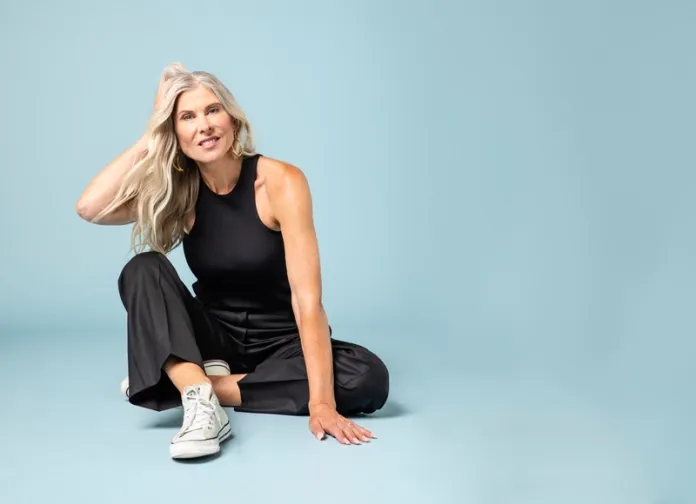(You Magazine) When Sharron Davies got the call last month, telling her the world swimming body Fina was banning transgender athletes who’d been through male puberty from competing in women’s elite races, she was full of ‘pride and relief’.
Davies, 59, who won silver for her swimming at the 1980 Moscow Olympics before going on to become one of our most recognisable sports presenters, had been campaigning for this change for three years. In her fight, she had endured death threats, vile abuse and a huge drop in income from employers too lily-livered to be associated with this ‘toxic’ debate. ‘There’s been so much hate and bullying,’ she says. ‘It’s been very hard. Charities I’ve worked with for 30 years have dropped me, agents I’ve worked with for 30 or 40 years don’t use me any more, because the trans activists can be so vicious and malicious – they go after your work, after your brand, they attack everything.’

How does she cope with the abuse and death threats? Davies shrugs. ‘When they threaten your children it’s hard. But mainly I just ignore it all. You can complain to Twitter and perhaps a person who’s threatened you will be blocked, but they’ll be back up in 24 hours. I feel so passionately about this, though, it’s all been worth it. Sport has taught me to be resilient – you get knocked down seven times and get up eight times.’
Only an inheritance from her mother, who died five years ago, has kept her afloat financially. ‘The money’s nearly gone now. But I can’t back down. If you have the courage of your convictions you have to back those up with evidence and science and then you just have to hold your ground.’
She never dreamed of finding herself vilified – alongside other women such as J K Rowling and Martina Navratilova – for insisting you can’t change someone’s biological sex. ‘But I quite like having a crusade now,’ she says. ‘It suits me to be busy.’ The first person to call her to congratulate her on Fina’s turnaround was her father Terry, who coached his daughter to win two Commonwealth Games gold medals when she was just 15 and her Olympic medal for the 400m individual medley two years later. ‘Dad was very emotional. He’s still coaching at 86, but he’s never been selected to coach the British team because he protested about what happened at the Olympics.’
Davies is referring to the Moscow Olympics 42 years ago. She won silver but, standing on the podium, her pride was combined with huge resentment that she’d been robbed of gold. That went to East-German Petra Schneider, one of many of the country’s female athletes who – as Schneider herself later admitted – had had her body pumped with testosterone in a state-sponsored scandal, putting her through a male puberty, giving her and her countrywomen an insuperable advantage over rival swimmers.
‘It was as obvious as the nose on your face the East Germans were taking something,’ Davies says. ‘They looked and sounded like men: they had Adam’s apples, deep voices – all the signs were there. At Moscow they were having 90 per cent success in women’s [swimming] events compared to only five per cent success in men’s. It didn’t take an Einstein to work out what was going on but nothing was done to stop them.’ It was that injustice which has been pivotal to her fight now against ‘a very small minority of very vocal trans activists who have made my life hell’.

For Davies, the knowledge she had no chance of beating these unfair odds was ‘hugely frustrating’. From a working-class family in Plymouth, she’d been striving for gold since she was eight. ‘I trained for six hours a day, six days a week, before and after school. All my family’s money was spent on me. We didn’t have summer holidays, my poor mum didn’t get a new washing machine or fridge for decades. My younger brothers hardly ever saw my dad because he was so engrossed in coaching me and Mum was left to try to juggle everybody else. But Petra swam ten seconds faster than me. It was impossible to beat her.’
When she saw the same unfairness cropping up with women who were born women having to compete against women who were born men and still retain all their physical advantages, she felt compelled to speak out.
Her campaign started in 2016 when the International Olympic Committee (IOC) changed guidelines which previously said trans women who wanted to compete in women’s sport had to have had sex reassignment surgery and lived as a woman for several years. Citing ‘human rights’, the IOC instead proclaimed that trans women were free to compete even if they’d never had surgery, if they’d claimed to be women for only a year and had less than ten nanomoles of testosterone per litre of blood (nmol/l). Which is startling when you consider the healthy range of testosterone for biological females is vastly lower, at between 0.3 and 2.5 nmol/l. It also ignores scientific evidence that trans women who’ve been through male puberty have bigger muscles, leaner body mass and a stronger grip than women who are born women, giving them a whopping advantage. From then, trans swimmers Davies describes as ‘mediocre’ began snatching victory from brilliant women.
Davies was – and is – incensed. ‘My whole generation missed out because of the East German situation. I was very lucky because I was the only British individual female medallist in 1980, but I have friends who came fourth after East Germans and no one has ever heard their names. With medals their lives would have been completely different. I could not stand by and say nothing as another generation misses out on what’s rightfully theirs.’
Sitting in an empty studio after YOU’s photo shoot, Davies is tall, tanned, lean and extremely glamorous. She looks so young that I’m startled when she proudly produces a photo of her granddaughter, two-year-old Ariya, daughter of her elder son Elliott, 28, who runs his own recruitment company. He’s one of her two children (the other, Grace, is 24 and works in PR) with her ex-husband, Olympic sprinter Derek Redmond. Her second son Finley – from her marriage to British Airways pilot Tony Kingston, which ended in 2009 – is 15 and a promising rugby player. ‘It’s such a cliché, but my biggest achievement isn’t my Olympic medal, it’s my kids,’ she says.
Can she believe she’ll turn 60 in November? Davies, who lives in the Somerset countryside near Bath, pulls a face. ‘It’s a weird one. Lots of bits of my body don’t work so well.’ The swimming has taken its toll on her shoulders, necessitating several operations. ‘Still, the kids asked what I wanted to do for my 60th and I said I want to abseil down the Spinnaker Tower in Portsmouth. I’ve said, “One of you is getting the short straw and coming with me.”’







